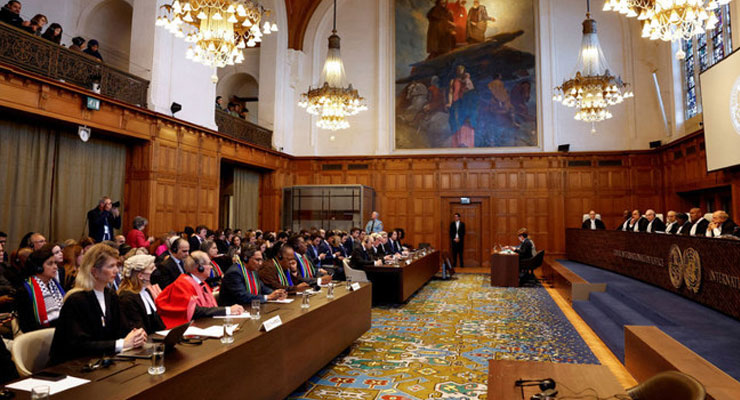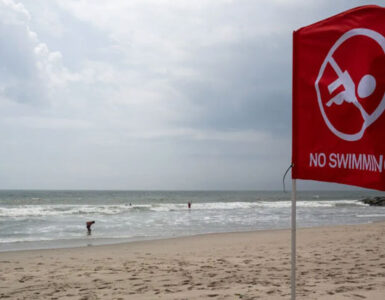The International Court of Justice commenced hearings on February 19 in a case challenging Israel’s occupation of Palestinian territories, just weeks after issuing provisional measures against Tel Aviv in a separate case alleging genocidal acts in Gaza, according to Al Jazeera.
In this unprecedented case, 52 countries presented arguments concerning contentious Israeli policies in the West Bank, Gaza Strip, and East Jerusalem. It marks the largest number of parties involved in any single ICJ case since its establishment in 1945.
The focus is on the case brought by 52 states against Israel before the International Court of Justice (ICJ). On February 27, the United Nations’ Food and Agriculture Organization (FAO) warned of an impending famine in Gaza due to Israel’s ongoing military actions following attacks by Hamas on October 7, resulting in over 1,100 casualties in Israel, mainly civilians. As casualties in Gaza approached 30,000, the ICJ held hearings on oral arguments presented by 52 states and three international organizations: the Arab League, the African Union (AU), and the Organization of Islamic Cooperation (OIC). The case, titled “Legal Consequences arising from the Policies and Practices of Israel in the Occupied Palestinian Territory, including East Jerusalem,” took place from February 19 to 26.
Even as the conflict in Gaza continues into its fifth month, Palestinians in the West Bank face increased attacks from Israeli forces, resulting in numerous casualties.
The ICJ stated that oral arguments in the case would span about a week, during which all countries and three international organizations would state their positions on Israel’s measures. Tel Aviv chose not to present oral arguments and submitted a written argument instead. A court ruling is expected in several months.
The case was initiated by a request from the UN General Assembly (UNGA) on December 30, 2022, when a majority of members voted to seek the court’s opinion on the legal consequences of Israel’s ongoing occupation of Palestine. Arab countries, Russia, and China supported the move, while Israel, the US, Germany, and 24 others opposed it.
During the Six-Day War in 1967, Israel occupied East Jerusalem and the West Bank, territories formerly under Jordanian control with an Arab-majority population. Most countries and the UN still regard occupied East Jerusalem as the capital of a future Palestinian state and consider Israel’s occupation illegal under international law.
In a comprehensive communication to the ICJ signed by UN Secretary-General Antonio Guterres, the UNGA requested judges to address questions concerning the impact of the occupation and ongoing displacement efforts on Palestinians, as well as the responsibilities of the UN and its member states in addressing these violations.
The UNGA asked the court to answer these questions using a combination of international humanitarian laws and the Charter of the United Nations, along with various UN resolutions. According to Human Rights Watch, Israel’s policies in the occupied territories amount to apartheid and persecution, both recognized as crimes against humanity.
The Hague-based court, which adjudicates matters between states, will weigh in on Israel’s illegal occupation for the second time. In 2004, the ICJ ruled that Israel’s ‘barrier wall’ in the West Bank, separating many Palestinian families, is illegal and should be dismantled. However, Israel rejected the ruling and has since extended the wall.
Throughout the week, 52 countries, approximately 10 per day, presented their arguments to ICJ judges. The majority of these countries initially supported the UN’s decision to seek the ICJ’s opinion. A few, such as Canada, opposed it, while Switzerland abstained from the vote.
This case is distinct from another ICJ case initiated by South Africa on December 29, alleging that Israel is committing genocide in Gaza in its ongoing conflict. In a preliminary ruling in that case, the court ordered Israel to prevent and punish incitement to genocide and provide necessary humanitarian aid by February 26.
While South Africa’s case focuses on potential breaches of the Genocide Convention resulting from Israel’s actions in Gaza, the ICJ’s opinion in this case will influence the UN General Assembly’s decision-making process. Despite its non-binding nature, the court’s opinion will carry significant legal and moral weight, potentially impacting future actions and international discourse.
During the hearings, states aligned with their positions on the broader Israel-Palestine conflict. Israel dismissed the court’s role, while the United States cautioned against forcing an Israeli withdrawal from occupied territories. Arab states and others emphasized the need for a two-state solution and criticized Israel’s occupation. The ICJ’s previous advisory opinion in 2004, declaring Israel’s separation barrier in the West Bank illegal, underscores the court’s potential influence on international law and policy.
As the ICJ case progresses, it holds implications for the ongoing conflict. Israel’s military actions in Gaza are linked to its claim of self-defense, while UN resolutions critical of Israel’s occupation may shape the court’s deliberations. The convergence of Arab calls for a two-state solution and Israeli resistance to Palestinian sovereignty intensifies the political stakes. The ICJ’s ruling could serve as a legal reckoning for Israel’s occupation, with far-reaching consequences for the region
The International Court of Justice started hearings on Monday, February 19 in a case against Israel’s occupation of Palestinian territories, barely a month after it issued a series of directions to Tel Aviv in a separate case where it is accused of genocidal acts in the Gaza Strip, reports Al Jazeera.
In a first-of-its-kind case, 52 countries presented arguments on controversial Israeli policies in the West Bank, the Gaza Strip, and occupied East Jerusalem. It’s the largest number of parties to participate in any single ICJ case since the court was established in 1945.





Add comment